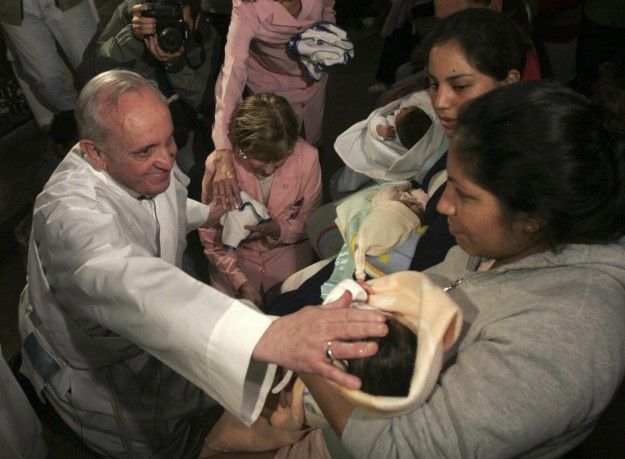Lent 2016
“I desire mercy, and not sacrifice” (Mt 9:13) The works of mercy on the road of the Jubilee”: it’s the theme of the Pope’s message for Lent 2016. In the document presented January 26 the Pope reminds us that faith “is found in concrete signs”, it requires corporal and spiritual works of mercy, “to reawaken our conscience, too often grown dull in the face of poverty”, and “an attentive listening” of the word of God. The Pope expressed a determined “no” to monopolizing thought and technoscience”, and to “a model of false development based on the idolatry of money”, which leads to closing the doors to the poor. The poor are also those persecuted on religious grounds. By “touching the flesh of Christ” also the “proud” and the “powerful” can convert

“Let us not waste this season of Lent, so favourable a time for conversion!” It’s the final appeal of the Pope’s message for Lent 2016 that begins of February 10, Ash Wednesday. “I desire mercy, and not sacrifice” (Mt 9:13). The works of mercy on the road of the Jubilee” is the theme of the document released by the Vatican on January 26. In the document the Pope refers to the appeal expressed in Misericordiae Vultus that “the season of Lent in this Jubilee Year be lived more intensely as a privileged moment to celebrate and experience God’s mercy” which, he explains, “is a proclamation made to the world, a proclamation which each Christian is called to experience at first hand”. For this reason, recalling n.18 of the Bull of Indiction of the Holy Year, mentioned several times in the message, Pope Francis reminds us:
“during the season of Lent I will send out Missionaries of Mercy as a concrete sign to everyone of God’s closeness and forgiveness”.
On February 10, marking the solemn celebration of Ash Wednesday in St.Peter’s basilica, before the remains of two great confessors, Capuchin Saint Leopoldo Mandic’ and Saint Pio of Pietrelcina, the Pontiff will confer the mandate to 800 “missionaries of mercy”.
Corporal and spiritual works of mercy, pointed out the Pope, “remind us that faith finds expression in concrete everyday actions meant to help our neighbours in body and spirit: by feeding, visiting, comforting and instructing them”.
For this reason, Pope Francis says he hopes that during the Jubilee “this will be a way to reawaken our conscience, too often grown dull in the face of poverty, and to enter more deeply into the heart of the Gospel”.
In the poor “the flesh of Christ” becomes visible ‘in the flesh of the tortured, the crushed, the scourged, the malnourished, and the exiled… to be acknowledged, touched, and cared for by us”.
“It is the unprecedented and scandalous mystery”, especially “when the poor are our brothers or sisters in Christ who are suffering for their faith”.
But “the real poor”, Francis points out, “are revealed as those who refuse to see themselves as such. They consider themselves rich, but they are actually the poorest of the poor” and “slaves to sin.” “The greater their power and wealth, the more this blindness and deception can grow” to the point of being blind “to Lazarus begging at their doorstep”, a figure of Christ, who “through the poor pleads for our conversion” and who “represents the possibility of conversion which God offers us and which we may well fail to see.” Such blindness “is often accompanied by the proud illusion of our own omnipotence, which reflects in a sinister way the diabolical ‘you will be like God’ which is the root of all sin” and which, the Pope warns, “can likewise take social and political forms, as shown by the totalitarian systems of the twentieth century, by the ideologies of monopolizing thought and technoscience, which would make God irrelevant and reduce man to raw material to be exploited.”
Francis also guards against “the sinful structures linked to a model of false development based on the idolatry of money, which leads to lack of concern for the fate of the poor on the part of wealthier individuals and societies; they close their doors, refusing even to see the poor.”
The season of Lent in this Jubilee Year “is a favourable time to overcome our existential alienation by listening to God’s word and by practising the works of mercy”, is the Pope’s encouragement in the final part of the message. “In the corporal works of mercy – the Pope writes – we touch the flesh of Christ in our brothers and sisters who need to be fed, clothed, sheltered, visited, in the spiritual works of mercy – counsel, instruction, forgiveness, admonishment and prayer – we touch more directly our own sinfulness.” For this reason they must never be separated. Thanks to them,
“By touching the flesh of the crucified Jesus” the “proud”, the “powerful” and the “wealthy” can can also be embraced and undeservedly loved by the crucified Lord who died and rose for them”, and thus convert.
But the works of mercy alone are not enough, hence the Pope calls for “attentive listening” of the Word of God.